Google Will Soon Rank “Passages.” Does It Matter?
On October 15, Google announced that it will integrate more artificial intelligence into its search algorithm, improve visual search, and work on 3D search functionality.
When it comes to organic results, the biggest news is Google’s new focus on “passages”:
By better understanding the relevancy of specific passages, not just the overall page, we can find that needle-in-a-haystack information you’re looking for. This technology will improve 7 percent of search queries across all languages as we roll it out globally.
So what’s going on? Do you need to do anything differently to keep—or increase—organic traffic?
The sky isn’t falling. You may not need to do anything differently, but there are some new opportunities. In any case, you’d better understand what the change actually affects to avoid wasting time and money on things that don’t matter.
What is passage-based indexing ranking?
Google insists that this is not an indexing change. This is a ranking change.
Somehow, it’s been referred to as “passage-based indexing” throughout the web, even in articles that claim it’s not an indexing change:

This matters because indexing and ranking are different stages in the process of generating search results.
Passage indexing would imply that Google is storing and retrieving (and perhaps even crawling) information in passage-sized chunks; passage ranking, by contrast, suggests that Google still crawls and indexes entire web pages but might rank a webpage based on a component of that page.
We’re not indexing passages independently of web pages. As we said.
There’s no “index” of passages that operates separately from our index of web pages.
Hope that clears things up.
— Danny Sullivan (@dannysullivan) October 20, 2020
The gist of the announcement—the part that matters to SEOs—is pretty simple.
Google will give priority to some less-powerful pages (those that’d otherwise rank lower) and even less relevant pages if there’s a passage on that page that does a great job of answering the query.
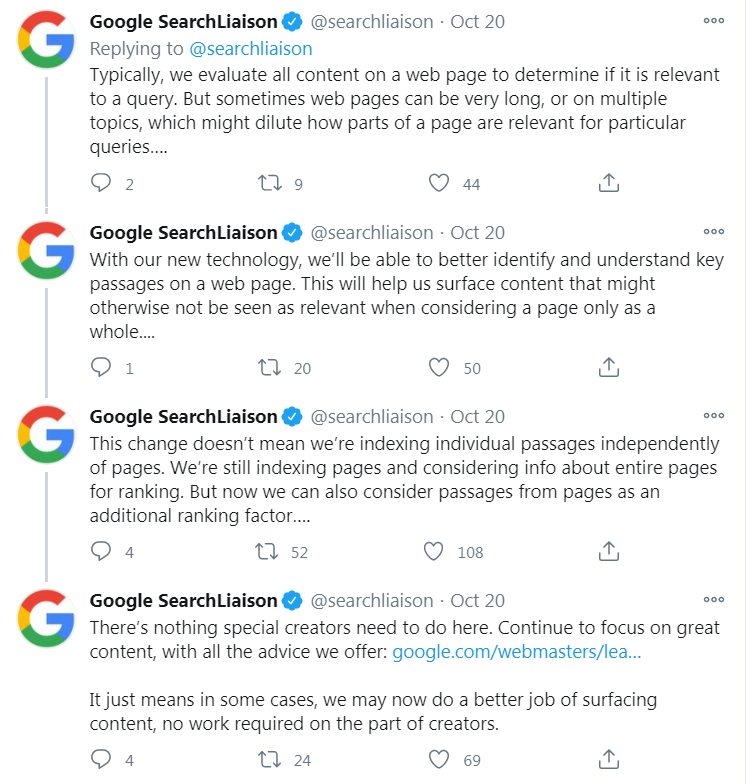
So, whereas pages were once the primary unit of comparison, Google, in some cases, will make passage-against-passage comparisons.
A few caveats on the announcement:
- It’s not live yet but will be sometime in 2021.
- The change will impact only very specific search queries (i.e. those seeking very specific answers). It’s safe to assume this will impact long-tail (i.e. low-volume) queries.
- Google’s improved understanding of passages may create more search snippets, which will generate even fewer clicks from search results. (Getting more answers in the search results lowers the motivation to click through).
Finding and highlighting passages isn’t exactly new
This change sounds like a logical extension of Google’s featured snippets—Google’s attempt to locate the best answer to a search query from within a web page and feature it on top of search results.
In doing so, Google:
- Tries to locate the part/section/passage inside a document that answers each query best. (In many cases, that’s not the document that actually ranks first for that query.)
- Uses that part/section/passage to generate an “answer” box.
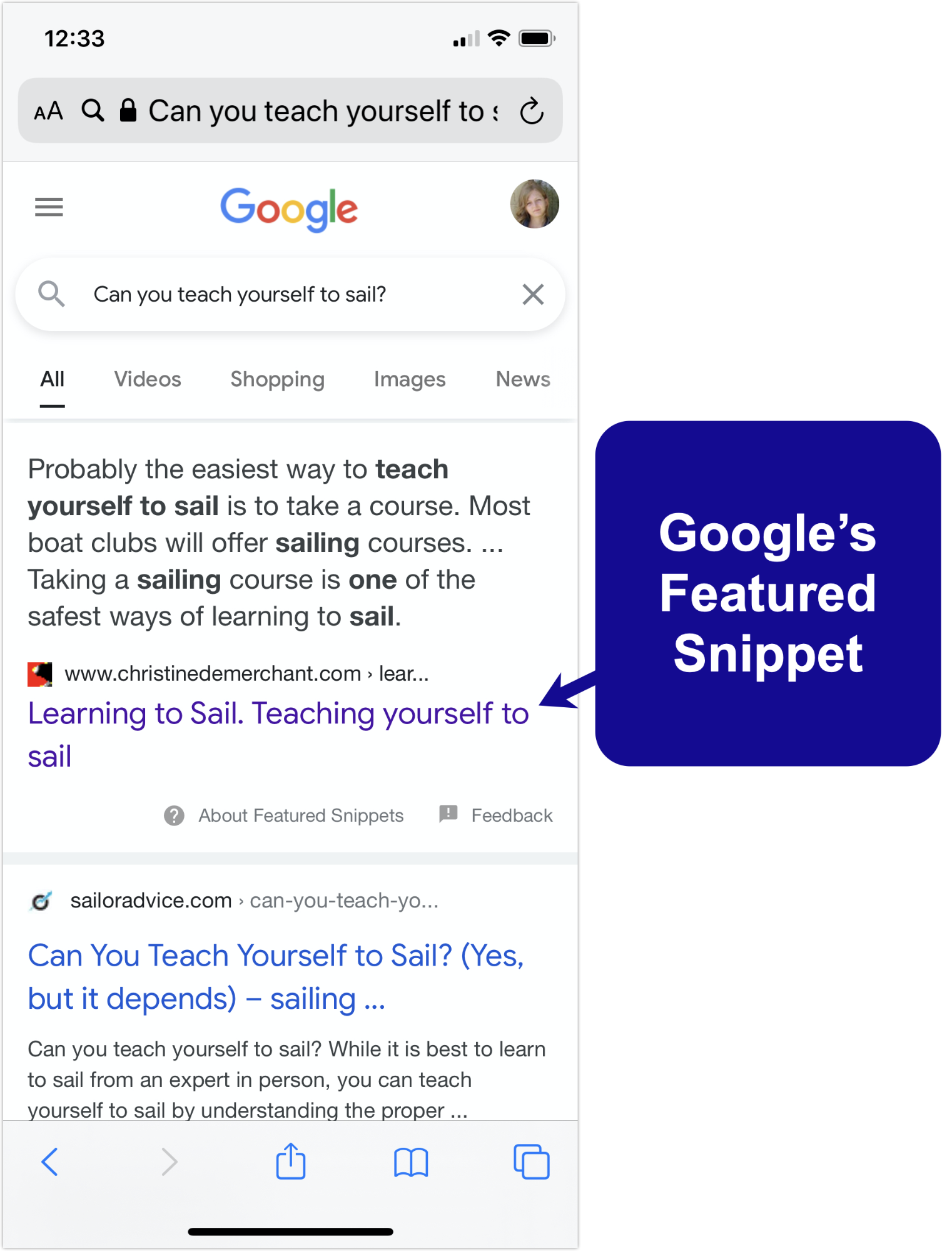
Look familiar? Of course. The change is more about an improvement in Google’s ability to locate the passages that become featured snippets.
It’s not going to look any different. It’s just a way to better identify web pages that are relevant to a query. The way we show relevant pages now? Still the same if we show a page based on improved ranking technology.
— Danny Sullivan (@dannysullivan) October 22, 2020
Historically, featured snippets often required, for example, a bolded definition below a “What is…” style question. But Google, over time, has improved its ability to find buried passages that answer a search query well and, in turn, could use those passages to generate (more than one) search snippet.
The big difference between featured snippets and passage-based ranking is that the featured snippet algorithm selects the source based on the entire page’s relevancy to the question, while the new passage-based algorithm looks at the relevancy of individual passages.
But in either scenario, Google needs to locate the best passages, so the optimization tactics remain the same.
So…do you need to do anything?
Maybe. Not every change to search algorithms requires action. But every change has the potential to adjust tactics—even if that adjustment means having to do less “for search engines” because algorithms improve.
So it is with passage ranking, in a couple of ways.
The “one page, one topic” mantra may fade.
In a page-versus-page world, it often wasn’t enough to have a section of a page dedicated to some topic. “Someone else will have a whole article on it,” you might think, so you’d better have a whole article on it, too.
The top results for a topic, in other words, are usually pages dedicated to that topic—not that specific topic and two or three other things.
Passage ranking may mean that you don’t actually need a separate page for every location or FAQ or glossary definition—especially if that site structure was built with search engines, not users, in mind (i.e. the UX is better with everything on one page).
The way I see it, the old-guard SEO’s that spun out multiple thin content location pages may create catch-all location pages. Or maybe you inherited that proverbial skeleton in the closet.
Folks are going to start pruning and 301 redirecting crap from this update.
— Victor Pan (@victorpan) October 20, 2020
Once passage ranking rolls out, for example, the short section at the bottom of this article on adding voiceover to videos could outrank an entire article devoted to the topic—if our section happened to include an (algorithmically) better answer to a user query.
You may have a shot at ranking for some things you previously didn’t.
If Google is better able to identify and understand relevant passages, the number of snippets that show up in search results should increase. If snippets increase, that means that any URL on Page 1 of results has a shot at the top spot.
So, perhaps, more SERPs will be in play for sites that otherwise would never be able to muscle their way to an above-the-fold position (because the top-ranking posts, for example, have hundreds or thousands of links).
Additionally, if Google improves its ability to understand and reward passages, that may decrease the influence of other signals—including links. Backlinks to a page are a proven proxy for the likelihood that the page has useful, credible information, but they’re still a proxy. If Google knows more about bits and pieces of text, the reliance on that proxy might lessen.
This, of course, is speculative, but it tracks with what Google actually wants to do—deliver the information you need, not the information that’s been linked to the most times.
I mean, I almost joked that inevitably someone will start pushing “passage SEO” as a thing. It’s not, and time is probably better spent by people focusing on great pages with great content that make sense for users since, you know, that’s what are systems seek to reward.
— Danny Sullivan (@dannysullivan) October 20, 2020
In any case—and as Danny Sullivan and others from Google would tell you—continue to focus on several things you already should’ve been doing. But if “there’s no way I’ll rank for that” once dissuaded you from honing in on certain elements, maybe it’s time to reconsider.
Some things you should do (that you already should’ve been doing)
Two major factors make this looming search update a little bit less confusing and scary than many bloggers make it sound:
- It will impact less popular, more specific queries.
- It’s not exactly new.
But don’t let the first note make you think that there’s nothing to be gained:
- Long-tail queries are better converting than high-volume keywords (thanks to being more focused/better targeted).
- In aggregate, long-tail queries can drive a ton of traffic.
So with Google surfacing more snippets from long-tail queries, how do you improve your chances of winning one?
How to max out your chances of winning a snippet
You’re likely already doing keyword research to identify how your target audience researches your topic and which answers they need in your content. (Luckily, there are quite a few tools for that.)
The only things I’d add to a traditional keyword research process:
Think about how best to answer each query. Just imagine yourself searching for the phrase. What would be a helpful format for the answer? A definition? A quick list? A chart with numbers? A comparison table?
Chunking information logically makes your content more user friendly and makes it easier for Google to identify high-value passages.
Research questions related to your target keyword. Researching questions is much like researching keywords, only more fun—you can relate to full-sentence questions easier than a string of words.
For the sake of scale and consistency, focus on the overall search patterns rather than individual questions. Keep asking yourself: “What is my target customer wondering about when researching this topic?
Three tools are helpful in identifying those searching patterns:
1. Buzzsumo Questions
Buzzsumo has a section showing you popular discussions around any topic. But the most useful part of the tool—at least in this context—is the “related themes” section, which helps you discover more ways your target topic can be researched and discussed:
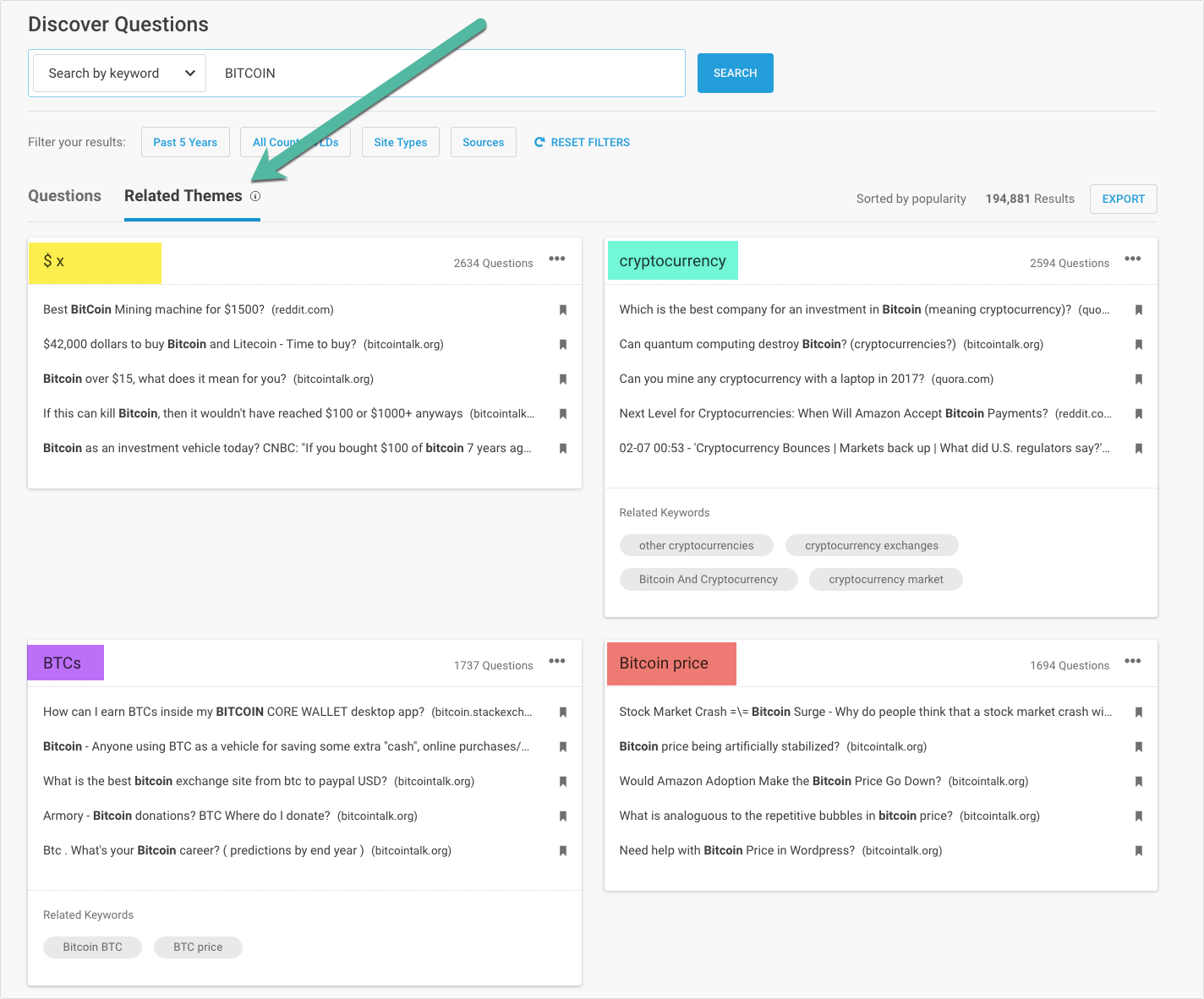
2. Google’s People Also Ask
Google’s People Also Ask boxes provide lots of insight into related questions for a search query.
You can find your relevant “People Also Ask” results for each of your key pages inside this Featured Snippet Tool, which collects questions that show up for queries your page already ranks for.
Again, no need to cover all questions. The idea is to identify patterns. These could be key questions (e.g., how much, how long, is it legal) or synonyms (e.g., blockchain, virtual currency, etc.).
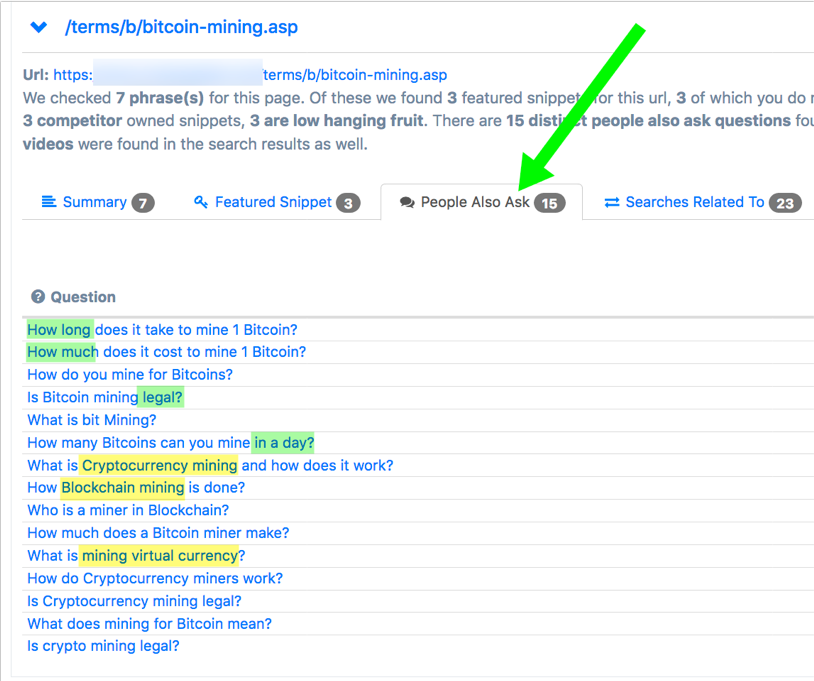
3. Text Optimizer
Text Optimizer is another useful tool that uses semantic analysis to identify underlying concepts and search patterns. The tool has a separate section to give you a clear idea of search patterns:
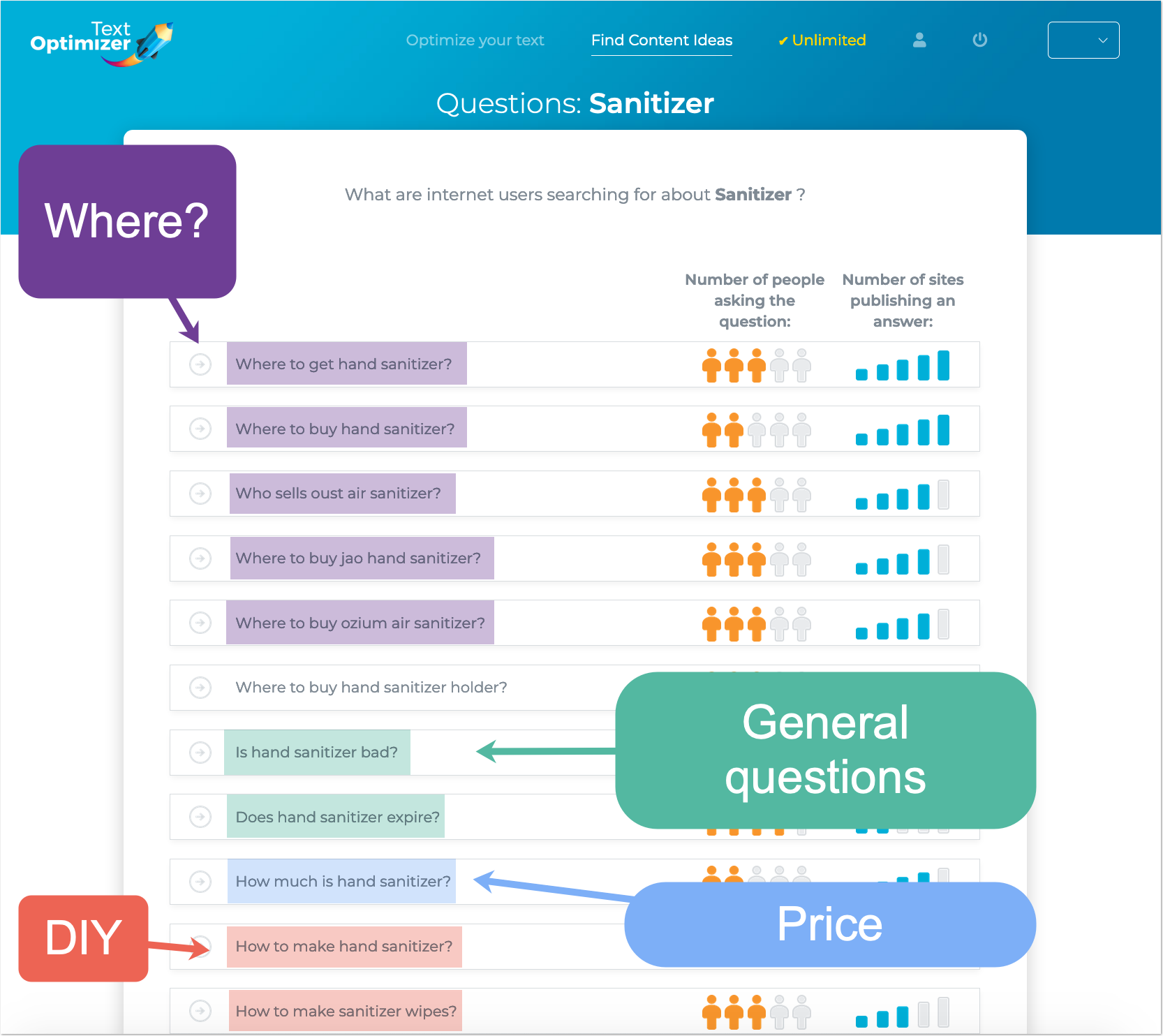
But optimizing for the long tail doesn’t require exact-match keywords
Over the years, a couple updates have made Google smarter at interpreting search queries, going beyond keyword matching and understanding the context in which words are used.
The first major data processing update was called Hummingbird. Hummingbird introduced the so-called “things not strings” data processing algorithm. It helped Google understand the query context and provide answers rather than just match keywords to web pages.
A more recent update, called BERT, improved understanding of the relationship among words in longer queries (rather than trying to match them word-by-word). A better understanding of longer queries inevitably means better answers, which, in turn, brings higher user satisfaction.
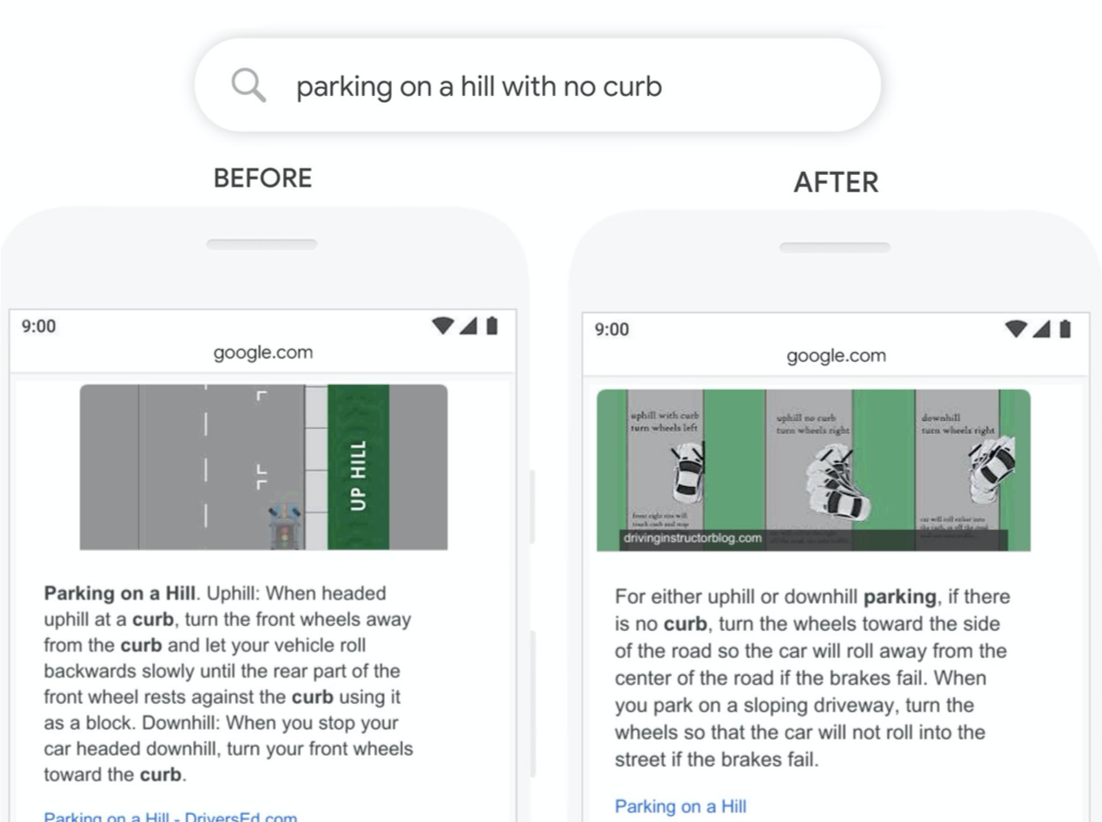
The takeaway here: You can focus on giving the most useful answer instead of forcing those keywords into your answers. Google is smart enough to identify the most valuable and helpful page (or passage!) without relying on an explicit match between the words in the query and the words on your page.
While we’re here—add a voiceover to your videos
Another section from Google’s announcement talks about videos. Just like with text content, Google is going to get better at identifying a more useful and relevant part of a video.
And, again, it’s not exactly new.
Google is already indexing video transcripts to suggest to users a part that would answer their query best.
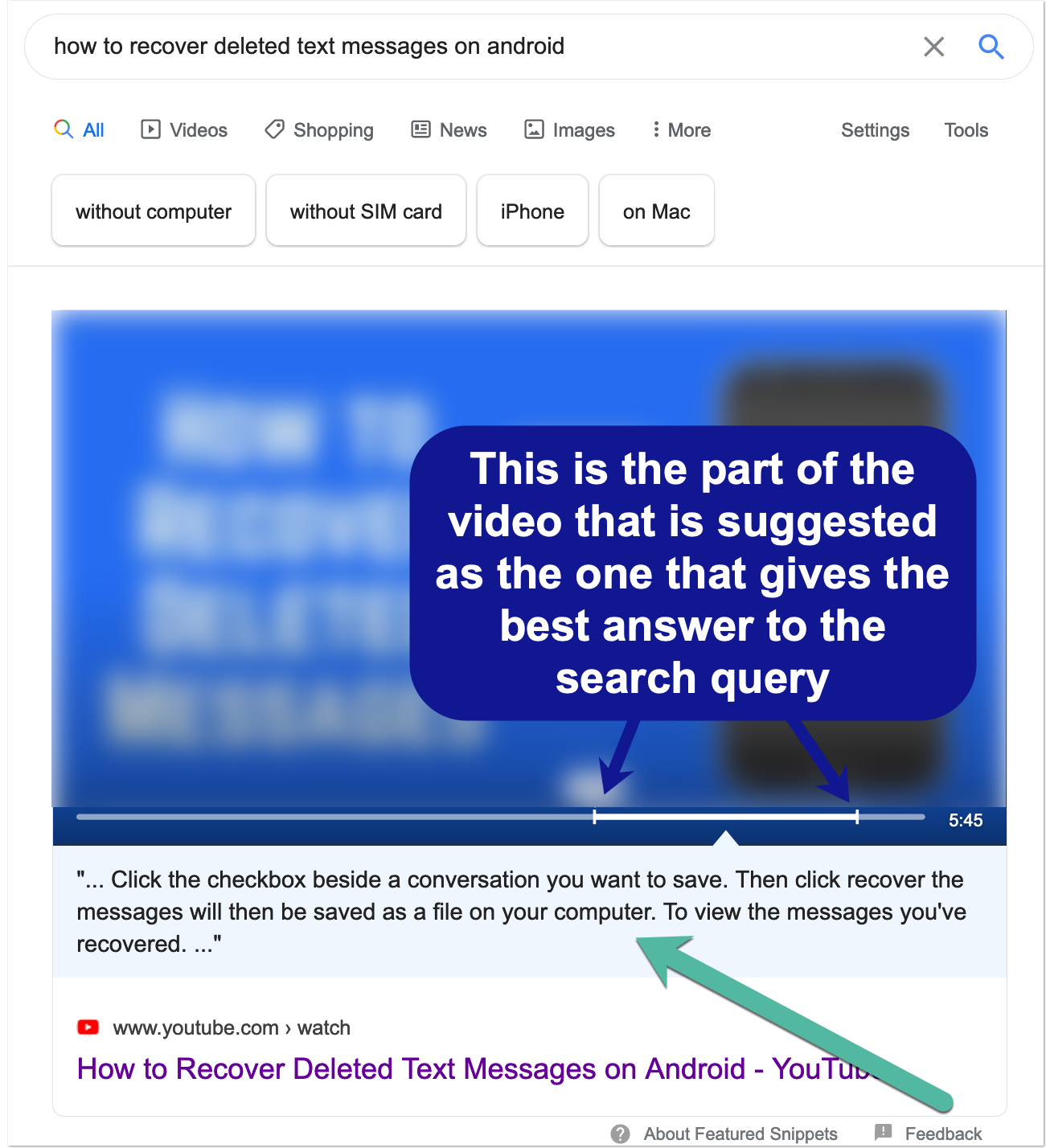
So it looks like they are simply going to do more of that.
To locate the best answer inside your video, Google needs an audio explanation so that the content shows up in the transcript, so this is something to make standard within your video strategy.
Most video production tools allow you to add audio and sync it with your video. I use a video maker called InVideo, which offers an option to upload my own voiceover, so it’s not hard:
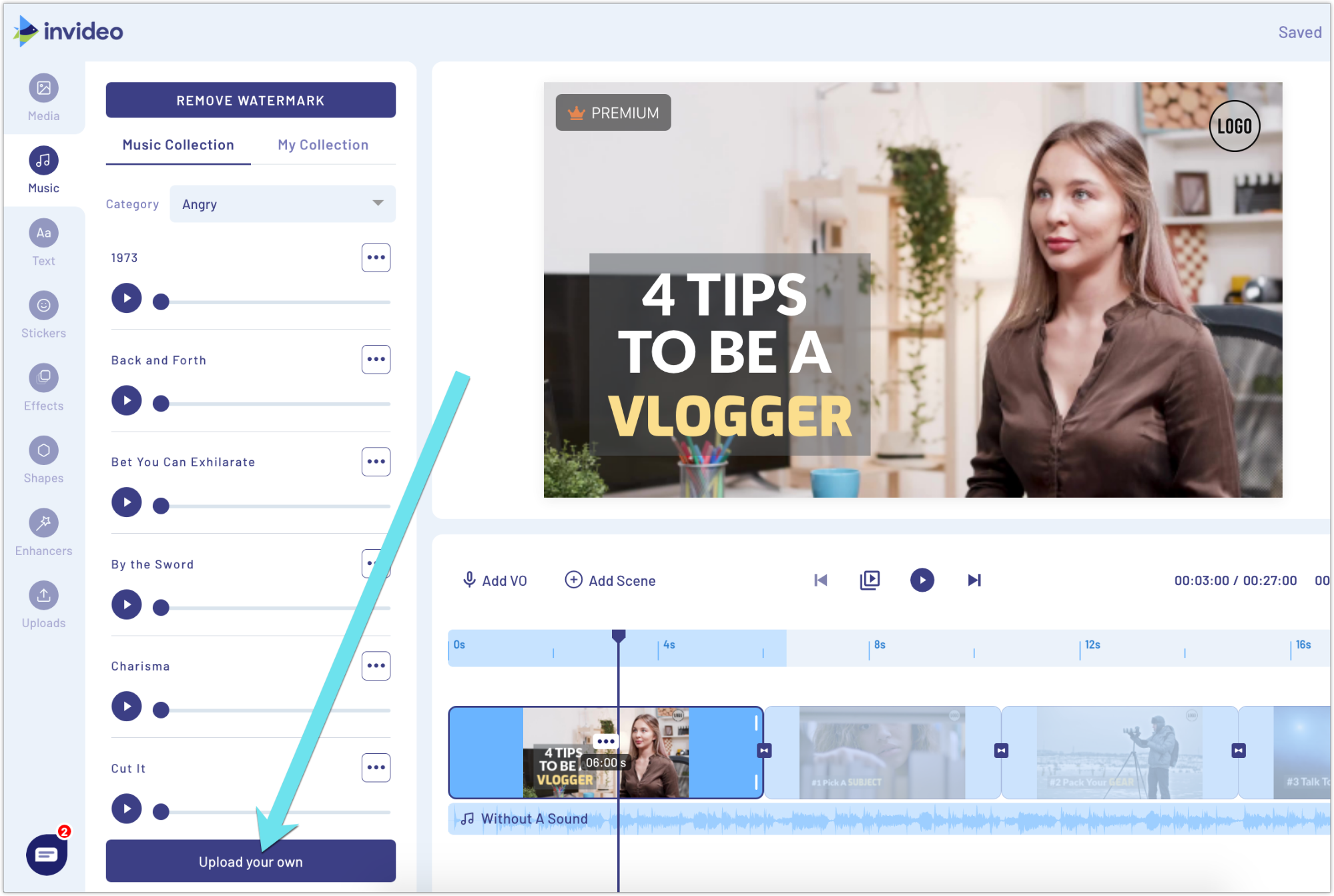
Conclusion
Google is constantly improving search results, and we, as marketers and SEOs, should keep an eye on changes and adapt our strategies accordingly.
The key here is to differentiate the click-baity articles from actually useful and informative content. I hope I was able to accomplish the latter.
Fundamentally, this update is not going to turn search upside down, nor is it offering anything really new to the search industry.
If nothing else, this update may be a good reminder for the search community to:
- Focus on giving useful answers.
- Create content covering more related questions and topics.
- Cater to users’ search intent (what would be the most helpful copy here?) instead of matching the copy to identified keywords.
- Leave quality-degrading metrics like “keyword density” behind.
Digital & Social Articles on Business 2 Community
(46)

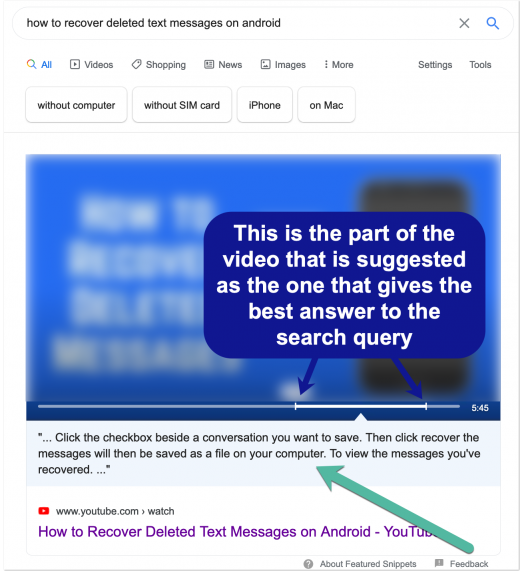
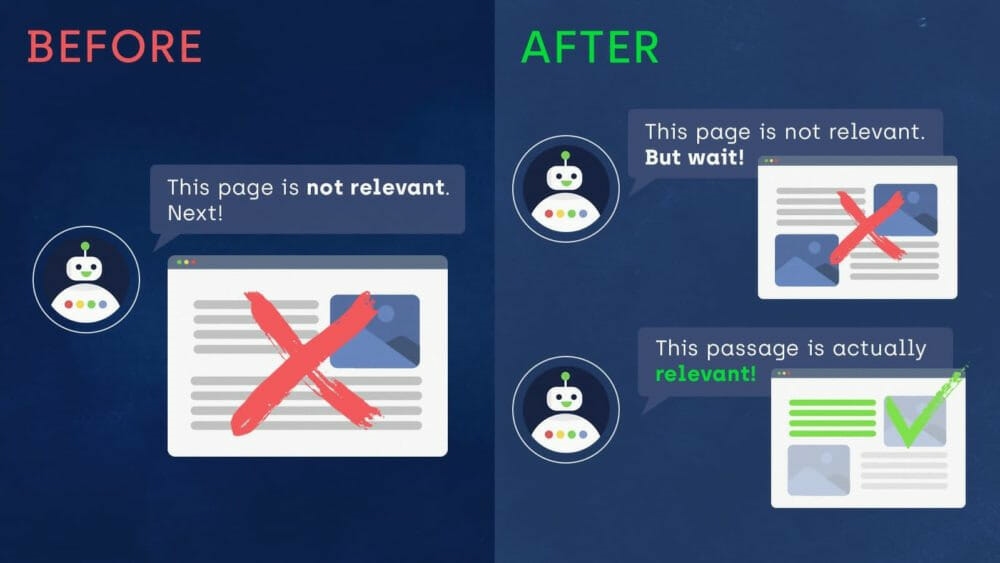 (
(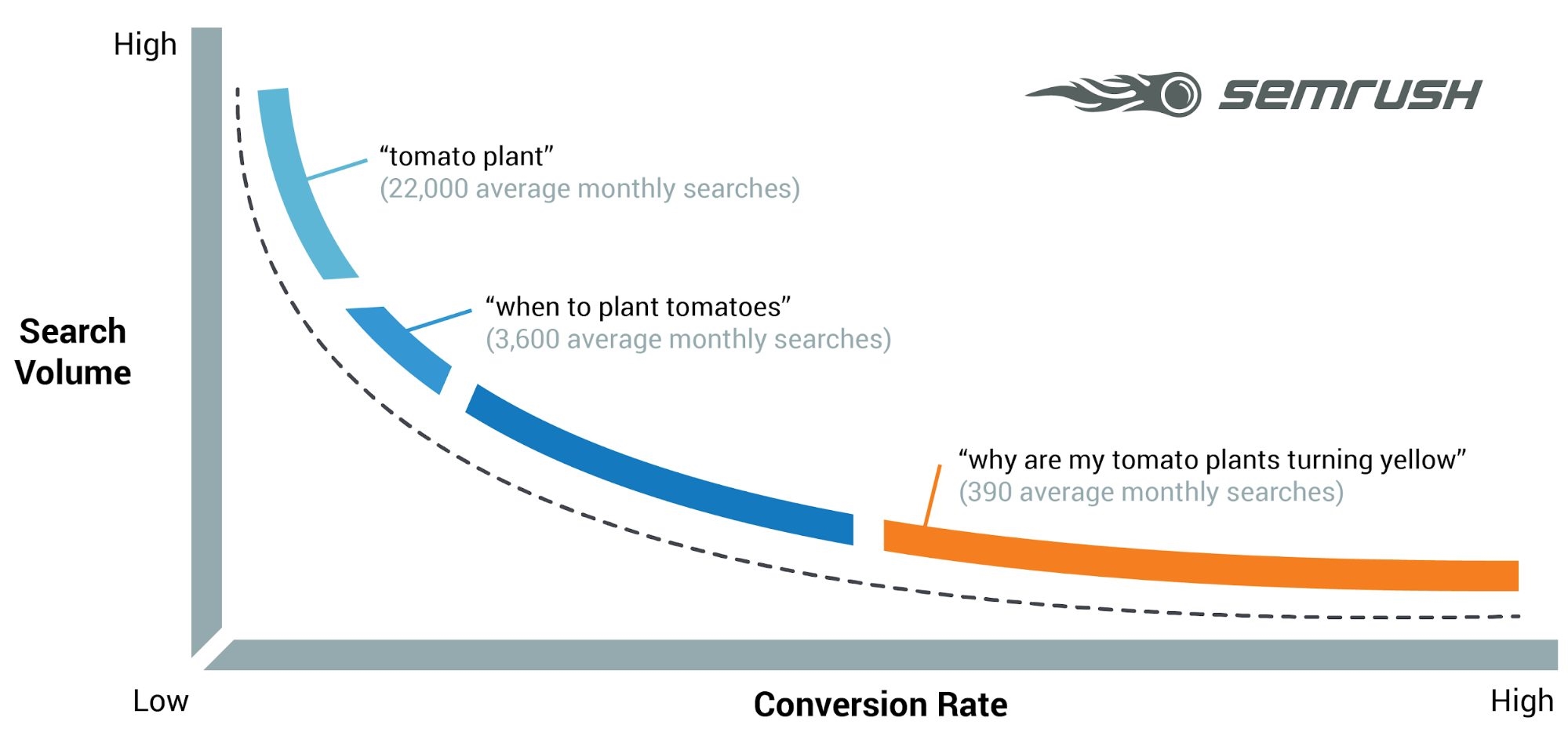 (
(